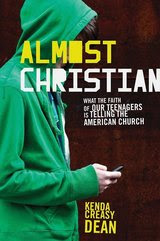 Moralist Therapeutic Deism—the religion of this age. There is a God, and he wants us to be nice and to feel good about ourselves. True, but what a watered down version of faith! It’s a far cry from “Be holy as I am holy!” This is not the religion of the apostles or martyrs, nor of medieval saints or the reformers. Moralistic Therapeutic Deism would never have driven the Pilgrims to the rocky shores of New England, or sent anyone to the Gulag Archipelago for defying an atheistic empire. This twenty-first century version of American Civic Religion serves a purpose in helping us to get along in a democracy, but it completely misses the essence of Christianity—God becoming a human being to suffer with us, die for us, change us and send us into a fallen world to reclaim it for the Kingdom of God. Moralist Therapeutic Deism is not a faith worth living for unless it is convenient, and certainly not worth dying for, and yet this is the faith we have bequeathed to our children. In Almost Christian: What the Faith of Our Teenagers Is Telling the American Church, Kenda Creasy Dean argues that the reason teens have such a whatever view of Christianity and often stop attending church in young adulthood, is that, despite the historic doctrines of our churches, this is all they have observed in our lives. We have failed to model a vital faith that impacts everyday realities, so it is easy to go on “believing” while reducing faith to something that makes me feel guilty if I’m mean and more comfortable when I’m sad. In her opening chapter entitled ‘The Triumph of the “Cult of Nice,” ‘ Dean says, ‘[American teenagers’] experience of religion is homogenizing, not polarizing; in fact what makes American churches such cozy places for Moralistic Therapeutic Deism is our easy, uncritical fusion of the “other” with ourselves—which of course, dismisses other’s identities by subsuming them in ours.’ (p. 30) ‘If this is the god we offer young people, there may be little in Christianity to which they object, but there is even less to which they will be devoted…. The God of the Bible traffics in life and death, not niceness, and calls for sacrificial love, not benign whatever-ism.’ (p. 37) ‘Moralistic Therapeutic Deism is what is left once Christianity has been drained of its missional impulse, once holiness has given way to acculturation, and once cautious self-preservation has supplanted the divine abandon of self-giving love.’ (p. 39-40)  Almost Christian is based on the results of the National Study of Youth and Religion. The raw data is analyzed in Christian Smith and Melinda Denton’s Soul Searching; the Religious and Spiritual Lives of American Teens (Oxford University Press, 2005). Their conclusion, based on extensive surveys, was that teens “believe” very much as their parents do. Yet this does not explain why so many abandon Christian practice as young adults. Dean attempts to answer this question, and she blames the church, including parents, for not challenging young people with a content-rich, missional faith. We were missionaries in Africa, yet I stand condemned along with the American church. We were so anxious to communicate cultural acceptance, different is not necessarily better or worse, that we may have let the same attitudes slip into our approach to religious practice. There are definitely things I wish I could do over. Dean’s solution does not start with the teens. It requires transforming the faith of parents and the church community to model the vital faith we want to so see in our children. Reading Almost Christian made me catch a new vision for my Sunday school class of 4th to 6th graders. I want them to see in me a faith worth hanging onto for a lifetime. This book is a must-read for youth workers and strongly suggested for parents before their kids get to be teens.
1 Comment
l
1/7/2015 07:59:59 am
This post was moved from another site. All comments were lost.
Reply
Leave a Reply. |
AuthorLeAnne Hardy has lived in six countries on four continents. Her books come out of her cross-cultural experiences and her passion to use story to convey spiritual truths in a form that will permeate lives. Add http://www.leannehardy.net/1/feed to your RSS feed.
To receive an e-mail when I post a new blog, please subscribe.
Categories
All
Archives
November 2022
|
 RSS Feed
RSS Feed